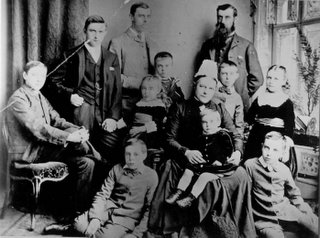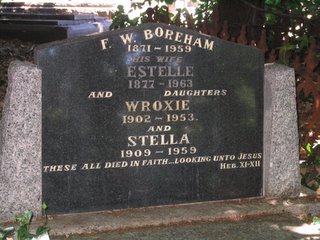
Woman of Strong Opinions
Like many famous people Frank Boreham often paid tribute to his mother for the way she encouraged and inspired his gifts. Frank was the eldest child and felt that he had a special bond with his mother in that his advent signaled the commencement of mothering for Fanny Boreham.[1]
Frank’s mother had an influential shaping role on him and his nine brothers and sisters. He said, “Mother was a woman of strong opinions and prejudices. She knew her own mind and seldom gave a reason for any judgments that she formed. If any of us asked her why we were not allowed to go with other girls and boys to Sunday School she simply told us that she liked us all to go to church with father and herself on Sunday morning; that she liked us to spend Sunday evening with herself; and that she thought that this was quite enough.”[2]
Storyteller Supreme
Boreham wrote many times of the impact of storytelling on his own life and his mother’s ability to hold her children spellbound:
“And we loved to gaze upon the old church at night. It seemed strange to see the stained-glass windows showing their glories to the passer-by instead of to the worshippers within. Yet, pleasant as all this was, it was costly. For it meant forsaking the circle around the fire. There mother gathered her boys about her; read with us the collects and the lessons that were being used in church; and then held us spell-bound with a chapter or two of some delightful book. It is wonderful how many books we got through on those Sunday evenings. Then, before we said good night, we turned out the gas and just sat and talked by the light of the dying embers. Most of us were sprawling on the hearth-rug, sitting on hassocks, or kneeling around the fender. It always ended with a story. And, of all the stories that I have since heard and read, none ever moved me like those stories that in the flickering firelight, Mother told.[3]
Many times his mother gave the account of a gipsy woman who saw baby Frank in his pram and predicted that he would become a writer. He also acquired a special bond with Charles Dickens who had a memorable encounter with Fanny when she was a young girl.[4]
In Touch Through Letters
Frank Boreham left England at the age of twenty-four and spent most of the rest of his life in Australasia. Throughout his ministry he was always grateful for his rich upbringing and the blessing his parents gave to him in responding to a call that separated the Boreham family:
“Never a day comes to me under these clear Australian skies but I am touched to tears at the memory of the goodness‑the self-sacrificing goodness‑that my father and mother lavished upon me in the dear old English home.”[5]
In the days before effective phone calls and email F W Boreham was wonderfully sustained by regular letters from Tunbridge Wells:
“It is getting on for twenty years since I exchanged the Old World in the north for this new World beneath the Southern Cross. And never a single mail has reached Australia through all these years that did not bear a letter from my mother.”[6] Frank kept these letters throughout his life but most were destroyed upon FWB's death. A letter from Mrs Boreham has been found, preserved in one of Frank's books.[7]
Through an Arch of Roses
Frank and Stella Boreham made many trips back to England. Early in the 1930s on one of the visits home it was clear that Frank’s mother would not last long. It was a time for reminiscing, a memorable communion in the home and the final farewells. Boreham in an essay entitled, An Arch of Roses describes the last time he saw his mother as he and Stella left the family home to return to Australia:
“We saw [her] through an arch of roses, her tall and stately form at the bay-window...and a strange medley of smiles and tears playing across her brave and wrinkled face. Good-bye, dear Mother mine! I do not know how you will appear when I see you again; but I am certain that you will not look less sweet than you looked in that early summer morning when, in your pretty blue robe and your dainty lace cap, I saw you for the last time through a riot of red, red roses.”[8]
Upheld By Memories
Upon arriving back in Australia it was not long before the telegram arrived to say that, “Mother passed peacefully.” The news arrived at Christmas time. This news took the shine off the celebrations but unloosed waves of sustaining memories.[9]
Geoff Pound
Image: One of the earliest photos of the Boreham family in Tunbridge Wells. Frank at the back next to his father. Fanny Boreham seated.
[1] F W Boreham, A Witch’s Brewing, 100
[2] F W Boreham, A Late Lark Singing, 23.
[3] F W Boreham, Arrows of Desire, 3.6
[4] Boreham, A Witch’s Brewing, 100.
[5] F W Boreham, The Other Side of the Hill, 107.
[6] F W Boreham, The Golden Milestone, 51.
[7] This is held in the F W Boreham Collection, Whitley College, Melbourne.
[8] Boreham, A Witch’s Brewing, 108-109.
[9] Boreham, A Witch’s Brewing, 100-109.


 Aussie Soil
Aussie Soil F W Boreham practiced his theme of 'making time for himself' through his passion for cricket. His wife is quoted in Who’s Who In Australia as saying that “if the house was on fire [her husband] would leave it to burn if there happened to be a cricket match in progress within twenty miles.”
F W Boreham practiced his theme of 'making time for himself' through his passion for cricket. His wife is quoted in Who’s Who In Australia as saying that “if the house was on fire [her husband] would leave it to burn if there happened to be a cricket match in progress within twenty miles.”
